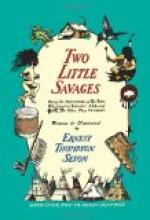“Well, Mother, when I killed the Shore-lark, that was froth going the wrong way, I did love the little bird. I know now why I killed it. Because it was going away from me. If I could have seen it near and could have touched it, or even have heard it every day, I should never have wished to harm it. I didn’t mean to kill it, only to get it. You gather flowers because you love to keep them near you, not because you want to destroy them. They die and you are sorry. I only tried to gather the Shore-lark as you would a flower. It died, and I was very, very sorry.”
“Nevertheless,” the mother replied, “the merciful man is merciful unto his beast. He who hearkens when the young Ravens cry, surely took note of it, and in His great Book of Remembrance it is written down against you.”
And from that time they surely drifted apart.
PART II
SANGER & SAM
I
The New Home
Yan was now fourteen years old long-legged, thin, and growing fast The doctor marked this combination and said: “Send him on a farm for a year.”
Thus it was that an arrangement was made for Yan to work for his board at the farmhouse of William Raften of Sanger.
Sanger was a settlement just emerging from the early or backwoods period.
The recognized steps are, first, the frontier or woods where all is unbroken forest and Deer abound; next the backwoods where small clearings appear; then a settlement where the forest and clearings are about equal and the Deer gone; last, an agricultural district, with mere shreds of forest remaining.
Thirty years before, Sanger had been “taken up” by a population chiefly from Ireland, sturdy peasantry for the most part, who brought with them the ancient feud that has so long divided Ireland—the bitter quarrel between the Catholics or “Dogans” (why so called none knew) and Protestants, more usually styled “Prattisons.” The colours of the Catholics were green and white; of the Protestants orange and blue; and hence another distinctive name of the latter was “Orangemen.”
These two factions split the social structure in two vertically. There were, in addition, several horizontal lines of cleavage which, like geological seams, ran across both segments.
In those days, the early part of the nineteenth century, the British Government used to assist desirable persons who wished to emigrate to Canada from Ireland. This aid consisted of a free ocean passage. Many who could not convince the Government of their desirability and yet could raise the money, came with them, paying their regular steerage rate of $15. These were alike to the outside world, but not to themselves. Those who paid their way were “passengers,” and were, in their own opinion, many social worlds above the assisted ones, who were called “Emmy Grants.” This distinction was never forgotten among the residents of Sanger.




